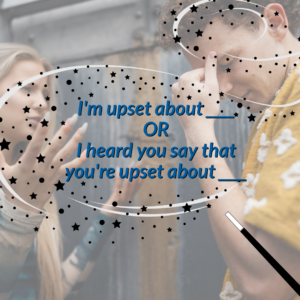In this COMMUNICATES series just know you are the Main Character.
In COMMUNICATES Happily Ever After, the fifth component we’re going to explore is Upset.
If you’re into reading or telling stories you know that the main characters can encounter people or situations where the protagonists can become upset with a person, a group of people, or an entire situation. Sometimes it can be a person or a group of people who are upset with the main characters either because something didn’t go according to plan or because the protagonists do something to upset somebody as they go through their journey.
Encountering different people and situations isn’t always easy and so for you, as the main character of your own story you will undoubtedly either upset someone or someone or situation will upset you.
That is just part of being human and a part of the human experience.
What do you do when you’re upset? Or when someone upsets you when things don’t go according to plan or something was said that shouldn’t have been said that left someone feeling upset about the specific comment?
When a person is truly upset, speaking and acting irrationally avoid saying ‘calm down’.
Even though that is exactly what the person needs to do, saying ‘calm down’ will just set the person off even more. How can a person be calm when everything is falling apart.
Would you be able to remain calm if everything was falling apart and didn’t go according to plan or wasn’t what you wanted nor expected?
Magic phrases that will lead to happily ever after…

Magic phrase
(If you’re the one who is upset): I’m upset about______(be specific about what you’re upset about. If it was said, state the exact statement that upset you, if it was an action, state the exact action).
(If someone is upset with you): I heard you say that you’re upset about _______(repeat back the list of items that the person listed he or she was upset about. Use the person’s exact words or words that are close to what the person said). I’m sorry to hear that this happened. I would be upset as well. I will do my best to help find a solution for you.
The whole idea is to avoid blame. Avoid putting blame on yourself and others. Blaming doesn’t help to solve an issue; in fact, it just creates more problems and headaches. Rather than blaming, the focus is on finding ways to resolve issues and conflicts.
One of the ways to resolve the issue is to acknowledge that you and/or the person is upset and given each person has free will, meaning the right to feel what he or she is feeling, then the person has the right to feel upset even if you might disagree.
Whether you agree or disagree does not matter.
What matters is that you acknowledge the person who is upset because of the specific reasons that were given by that person and you show him or her you care by validating what the person said to you.
In return you want the person who hurt you to validate your feelings by repeating what you said so that you know you were seen, heard, and understood.
The truth is that when you’re upset or if someone is upset with you, you and/or the other person wants to be validated.
You validate someone by repeating back what the person said.
As a main character in your story, you don’t have to agree or disagree with the reason for someone being upset and likewise the person doesn’t have to agree or disagree with you when you’re the one who is upset. You can certainly choose to validate a person’s feeling or not.
Validating someone who is upset is an easier path that will lead you to your happily ever after.
If you’re an introverted, people pleaser, conflict-phobic person who would love to openly and confidently communicate your thoughts, feelings, and desires without the fear of arguments and criticisms so you can have your happily ever after, then click below to book your free Communication Breakthrough Session where we will discover 5 obstacles that are stopping you and One step to move you toward to living your happily ever after.
Warm regards,
Grace CW Liu
Communication Coach & Navigator
W: GraceSOULutions.com


